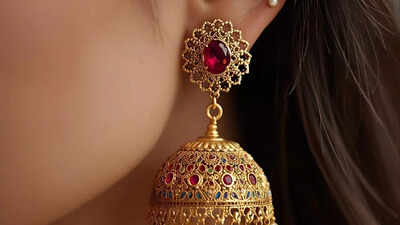Can your jhumkas cause an ear infection: Side effects and prevention tips |

There is something utterly enchanting about a jhumka swaying with every turn, glinting under the warm Delhi sun, or reflecting the soft glow of a Jaipur haveli. Jhumkas are not just jewellery. They are whispers of Indian tradition, echoes of festive celebrations, and little treasures that complete every outfit. But even these magical ornaments, if not handled carefully, can sometimes lead to ear problems.While we love the sparkle and charm of jhumkas, the reality is that dust, bacteria, and low-quality metals can turn a dream accessory into a source of irritation. A small slip in hygiene, such as touching a jhumka with unwashed hands or wearing an old, unclean pair, can invite redness, swelling, or infection. Research from the National Center for Biotechnology Information shows that bacteria like Staphylococcus aureus and Pseudomonas aeruginosa are often present on earrings and can cause ear infections.By understanding the causes and practicing safe habits, you can enjoy your jhumkas without worry while keeping your ears healthy.
How does a jhumka ear infection happen
Jhumka ear infections usually occur due to bacterial growth, allergies, or improper cleaning. Earrings, especially those made from low-quality metals, can harbour bacteria that cause irritation and infection. A study highlights that bacteria like Staphylococcus aureus are commonly found on earrings, making proper hygiene essential.Allergies are another cause. Nickel, present in many imitation earrings, can lead to redness, swelling, and itching. Over time, repeated exposure to nickel can make the skin more vulnerable to bacterial infections.
Poor hygiene and jhumka ear infection
One of the main reasons jhumkas cause ear infections is poor hygiene. Touching earrings with unwashed hands or not cleaning earrings regularly allows bacteria to thrive. Studies emphasize that regularly sanitizing earrings and cleaning pierced ears is crucial to prevent infection.Avoid wearing the same pair of earrings every day without cleaning them. Even a small amount of accumulated dirt or sweat can turn a lovely accessory into a source of discomfort.
Piercing technique and jhumka ear infection
The method of piercing also affects the risk of jhumka ear infection. Using non-sterile equipment or improper piercing techniques can introduce bacteria deep into the ear, causing pain, swelling, or pus. The Mayo Clinic recommends sterile procedures and careful aftercare to minimize the risk of infection.
How to prevent jhumka ear infection
Keep your jhumkas clean
Regularly wash your jhumkas with mild soap and water or use an alcohol swab to disinfect them. Clean your hands before handling earrings to prevent bacterial transfer.
Choose hypoallergenic materials
Opt for earrings made of gold, platinum, surgical steel, or other hypoallergenic metals. These metals reduce the risk of allergies and irritation that can lead to infection.
Follow proper piercing care
After a piercing, follow the professional aftercare advice carefully. Avoid touching the piercing unnecessarily and watch for early signs of infection.
Rotate your earrings
Do not wear the same jhumkas every day without cleaning them. Rotating earrings prevents bacterial buildup and keeps your ears healthy.
Avoid heavy jhumkas for long hours
Overly heavy jhumkas can irritate the ear and cause small tears in the skin. These tiny openings are perfect spots for bacteria to enter and cause infection.
Signs of jhumka ear infection
Early recognition of infection can prevent serious issues. Watch for:
- Redness or swelling around the pierced area
- Persistent pain or tenderness
- Pus or unusual discharge
- Itchiness or discomfort
- Seek medical advice if symptoms persist to prevent worsening of the infection.
Jhumkas are a magical part of Indian tradition. They bring charm, sparkle, and elegance to every outfit. By practicing proper hygiene, choosing quality materials, and monitoring for early signs of infection, you can enjoy your jhumkas safely. A little care ensures that your ears remain healthy and comfortable, letting your favorite ornaments shine as brightly as you do.Disclaimer: This article is for general informational purposes only and is not a substitute for professional medical advice, diagnosis, or treatment. Always seek the guidance of a qualified healthcare provider regarding any medical condition or lifestyle change.Also read| Harvard sleep trick: Why socks help you fall asleep faster






